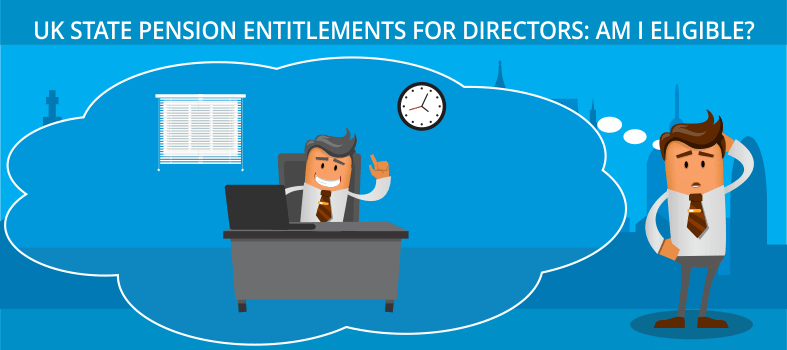UK State Pension Entitlements for Directors: Am I Eligible?
This is a question I have been asked many, many times:
"As a director of my own limited company am I still eligible for the Basic State Pension?"
What is the Basic State Pension?
Every UK National is entitled to the Basic State Pension on retirement; a regular payment from the government payable at pensionable age—now gradually increasing for women to bring them in line with men, age 66, by 2020. To earn full state pension entitlement you are required to have National Insurance Contributions (NICs) credits for 30 qualifying years. Currently, the most you can expect from a state pension is £129.20 per week. It increases annually in line with the Consumer Prices Index (CPI), currently at 2.5%.

Additional State Pension
The Additional State Pension is what it says; it’s paid in addition to the basic state pension. This is based on your NI contributions, and how much you get depends on your earnings and whether you’ve ever claimed certain benefits. There is no fixed amount like the basic state pension. You get the additional state pension automatically, unless you’ve contracted out of it, but we won’t dwell on this here because it has changed in 2016 when government carried in the single-tier pension.
National Insurance (NI)
NI is different from income tax: first, not everyone needs to pay it; only those earning income through PAYE or who are self-employed above the age of 16 and below the statutory retirement age, pay NI. Second, payment of NI means that you are entitled to certain state benefits that are linked to your NI number. Everyone who pays NI builds up an entitlement to a state pension; unemployed people build up a fund through unemployment benefits and other benefits linked to their circumstances.
NI for the employed and self-employed
The amount of NI you pay depends on whether you are self-employed or employed and how much you earn. Self-employed NI is only for those who trade under their personal name and are registered with HMRC. Self-employed Class 2 NI contributions are paid at a flat rate of £3 a week, although earnings below £6,365 per year (2019–20) may mean that no NI is due. The self-employed also pay Class 4 NI on their profits at 9% between £8,632 and £50,000 and 2% on profits over £50,000 amount. The employed pay Class 1 (primary) at 12% i.e £166 to £962 a week of "taxable" income up to £719 to £4,167 a month and 2% i.e. over £962 a week of "taxable" income up to £4,167 a month after deducting various allowances.
NI and Limited Companies
Paying a minimal salary and taking the rest from the company’s profits by way of dividend is what the majority of owner-managed companies do. As the company is free to pay its directors whatever they want (directors’ income is not subject to minimum wage legislation), it makes sense to maximise the amount paid by dividend and therefore avoid paying employees’ and employers’ NI.
This is the beauty of owning your own limited company, because only employees and the self-employed pay NI, while directors receive dividend income which, as a return on your investment in the shares of the company, is not subject to NI.
How do I get state support without paying NI?
Let’s get back to the question: "As a director of my own limited company am I still eligible for the Basic State Pension?"
Yes you are: NI is not payable until employed earnings exceed £166 per week or £719 per month for 2019/20 (the primary threshold), but the NI system starts for income above £118 per week or £512 per month for 2019/20 (the lower earnings limit). Providing you are paid between these two amounts, you will get a credit for NI even though you have not paid a contribution either as an employee or employer. This free credit was introduced to help the low-paid build up benefits entitlements, but it’s a huge advantage for directors of limited companies.
How does it work?
When a salary of, say, £7,020 (below the lower earnings limit) is paid annually, the state pension will receive the year’s credit even though no NICs has been paid by the director or company.
If the salary level is below this amount, or no salary is paid, the pension fund will lose the credit for that year, and although it is possible to purchase voluntary NICs retrospectively for up to six years, they are purchased on a weekly basis and are expensive.
Below examples can help you to understand how does it work -
Sam
Sam’s yearly earning is £13,832 which is £266 per week, in a part time based job as a food delivery boy. Each week he pays Class 1 NIC of:
| £ | |
| First £166 | Nil |
| £266 - £166 = £100 @ 12% | 12.00 |
| 12.00 |
Lucy
Lucy works for a single manager, but she doesn’t have a fixed income. Every month her salary varies depending on how much overtime she works.
Each month her manager deducts Class 1 NIC from her salary, using the employee rates and thresholds for 2019/20. The monthly primary threshold is £719.
| April | £ |
| April earnings | 819 |
| Take off April Primary Threshold | (719) |
| Pay subject to Class 1 NIC | £100 |
| (Class 1 NIC at 12% is £12) | |
| May | £ |
| May earnings | 819 |
| Take off May Primary Threshold | (719) |
| Pay subject to Class 1 NIC | £100 |
| (Class 1 NIC at 12% is £12) | |
| June | £ |
| June earnings | 1,019 |
| Take off June Primary Threshold | (719) |
| Pay subject to Class 1 NIC | £300 |
| (Class 1 NIC at 12% is £36) | |
| July | £ |
| July earnings | 619 |
| Take off July Primary Threshold | (719) |
| Pay subject to Class 1 NIC | £0. Note no refund of Class 1 NIC previously paid is due. |
| And so it goes on throughout the year |
Alisha – two jobs
Alisha works for 2 different jobs. Each week how much Class 1 NIC she will be paying in 2019/20.
Alisha receives £186 per week from her job as a part time dance teacher and a further £75 a week as a part time assistance in a shop.
She doesn’t require to pay NIC on the income she gets after working as a part time assistance. But she needs to pay NIC for the earning she receives after working as a dance teacher.
Every week she will be paying £2.40, which is £186 fewer the primary threshold of £166 at the rate of 12%. (In other words £20 per week at 12%.)
Alisha’s employer at the dance school will take this class 1 NIC from her salary, along with any income tax due, before paying to her. Alisha also needs to pay income tax on her wages as a part time assistance.
Shelly – How the lower limit for NIC works?
All earns £5,500 per year, but the job is seasonal, so she works a lot during the time of Christmas and on other bank holidays.
All earns £5,500 per year, but the job is seasonal, so she works a lot during the time of Christmas and on other bank holidays.
Shelly pays NIC on her incomes of £650 in Christmas and Easter week, as in these weeks her incomes surpass the primary threshold.
Maria – part time employee on a low income
After doing her part-time job Maria’s earning per week is £100. She pays no tax on Class 1 NIC. Her employer offers her some extra hours. If she accepts those extra hours then she can earn an income of £120 per week. She is concerned that she will have to pay Class 1 NIC and the extra work will not be meaningful.
Presently Maria’s income is below the lower earnings limit for Class 1 NIC. That means she is not allowed to contributory benefits and is not ensuing qualifying years for state pension purposes.
By increasing Maria’s working hours, her earning will increase above the lower earnings limit (£118 per week) for the purposes of Class 1 NIC. Although, as her incomes are less than the primary threshold of £166 per week, she does not truly pay Class 1 NIC, instead she is credited with NIC.
This means she could gain entitlement to contributory advantages and possibly a qualifying year for state pension purposes, without having to physically pay out whatever in terms of Class 1 NIC. Her salary is also not enough to pay any tax, so she will be able to keep the entire of her £120 per week, though it could affect any state benefits she presently receives.
Although, if her incomes increase above the primary threshold (£166 per week in 2019/20), she will require to start paying Class 1 NIC at 12% on the extra above £166 per week. She might have to pay the income tax as well, based on her tax code.
Amanda – salary sacrifice
Amanda has an income of £170 per week. She pays for her child to join nursery. Her employer has given a proposal to her where she gives up cash salary in exchange for her child attending a workplace nursery provided by her employer, as this will save her tax and NIC on nursery costs. The sacrificed amount is £170 per week.
Presently she is paying Class 1 NIC at the standard rate of 12% on incomes above £166 per week for 2019/20. This associates to contributions of £0.48 per week.
If she exchanges £55 of cash income for £55 of workplace nursery option each week, she will have cash income of only £115 per week. This will take her income below the lower pays limit and outside the NIC system. This could undesirably affect Amanda’s entitlement to contributory benefits, legislative maternity pay, statutory sick pay, and statutory adoption pay and also her state pension privilege. Amanda could be allowed to some NIC credits instead, that could give privilege to some benefits, but she will have to evaluate the position cautiously.
This planning will also decrease Amanda’s right to tax credits on her childcare costs, because you can’t claim tax credits on childcare expenses that are funded by someone else, for example, by your employer. She is therefore probably to lose much more in tax credits than she saves in Class 1 NIC. Note that if Amanda doesn’t have any other taxable income, she won’t get any advantage from any reduction in income tax accountability as she was not responsible to income tax under any situation.
Her employer might also be in break of the national minimum income rules.
Conclusion
In summary, in terms of tax and NI, having your own limited company has huge advantages over being self-employed or employed. In addition to this, it is also more beneficial from a pension perspective. Also, a small director's salary above the LEL of £6,136 per year will grant you the pension contributions you require whilst costing nothing in NI payments.
As mentioned, from April 2016, the basic state pension has been replaced by the single-tier pension, but hopefully this change will not affect the way that limited company directors benefit.
Any questions? Schedule a call with one of our experts.








